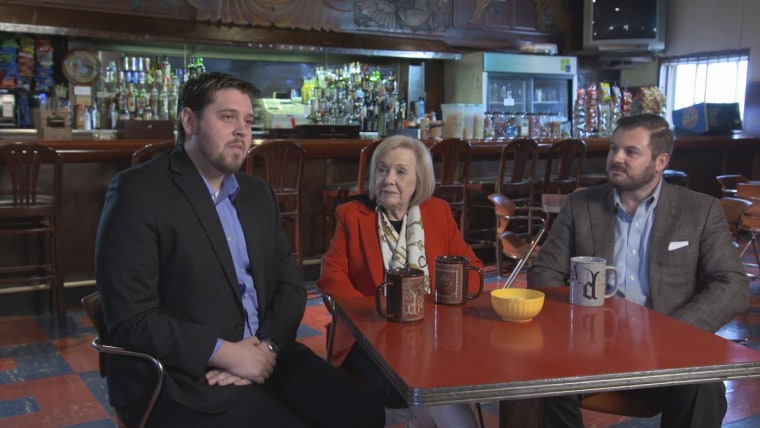One of the other remaining candidates in that district, Mike DeVanney, who has experience managing both mayoral and gubernatorial campaigns in Pennsylvania, added, “I think that’s a very important distinction, that this is a party process. Primaries are party processes.” Addressing the critique that this is a disenfranchising system, DeVanney reiterated, “I just don’t see that at all. This is a party function. We’re here to the nominate the best candidate. And then voters will have the opportunity to decide what they want to do in November.”
Kaaren Amodeo and Denise Johnston, the women who challenged Sterns, are both former Oakmont Republican Committee Chairwomen. Their lawyer, Ron Hicks, is the Solicitor for the Republican Committee of Allegheny County. In addition to Allen Stern, they brought challenges against three other delegate-candidates in the 14th Congressional District. Each of those candidates also chose to withdraw from the race, rather than fight the candidates in court. When speaking with MSNBC, Hicks explained that his role as Solicitor is separate from his private practice and that he represented Amodeo and Johnston in a private capacity. He was emphatic that the Republican Party of Allegheny County did not challenge those four delegate-candidates, his private clients did. Ed Saxon, the Chairman of the Oakmont Republican Committee told MSNBC that Amodeo and Johnston are no longer formally involved with the Oakmont Republican Committee.
Seven people submitted their filing fees and paperwork to run for Republican national delegate in the 14th Congressional District. Four of them were challenged by Amodeo and Johnston, and those four withdrew. Now there will only be three candidates on the ballot for three national delegate spots. Through their challenges, Amodeo and Johnston have essentially determined the outcome of the race.
This isn’t the only race to have been clinched before primary day. Pennsylvania’s 1st Congressional District will only have three candidates on the ballot for Republican national delegate as well. Back in February, five candidates had filed to enter the race, but two of them were challenged by Mike Cibik, the Vice-Chairman of the Philadelphia Republican Executive Committee.
While Cibik is a self-described “diehard Trump fan,” he explained that ideology wasn’t the impetus for his challenges. He said that earlier-on the local party had met and decided to endorse Chris Vogler and Seth Kaufer for national delegate. Cibik said that he challenged two of the other candidates because, he said not only did they not have the local GOP’s support, but the total number of signatures that they each submitted didn’t surpass 250 by more than a hundred; thus, he said it was reasonable to expect that he could find enough potentially illegitimate signatures within those candidates’ nomination petitions to effectively cast doubt on whether they actually met the state’s requirements.
Despite being a strong Trump fan, Cibik challenged one of the delegate-candidates who was known to also be a Trump supporter. In fact, this challenged delegate, who has been a registered Republican for less than a year, told MSNBC that the Trump campaign had coordinated his entire delegate-candidacy. The campaign organized the circulators who collected the signatures for this candidate. He hadn't actually met the circulators before, and they hadn't known him prior to collecting signatures for him. Some of these circulators drove in from Lancaster, PA to collect signatures in the candidate’s congressional district, which is mostly in Philadelphia. It is about an hour’s drive between the two cities, and the Trump campaign reimbursed the circulators for the cost of gas for those trips back and forth. (Signatures collected by circulators from different congressional districts than the candidate aren’t supposed to count towards meeting the 250 state-required threshold, so it appears that at least some of the signatures that this candidate submitted were illegitimate.)
The Trump campaign invested resources and manpower into this delegate-candidacy, yet it was challenged by a decidedly pro-Trump local party leader. Cibik explained that, while he could have ended up voting for this pro-Trump delegate candidate, he challenged him because “the kid did it the wrong way.” If he had attended the local party meeting and sought its endorsement, Cibik insists that the race may have turned out differently.
Pennsylvania’s uncommitted delegates could play a significant role at this year’s Republican National Convention. While these are local races, influenced by local party actors, it seems that they share a theme with the national race: insiders vs. outsiders.
